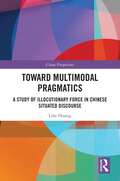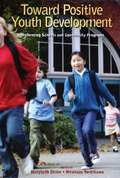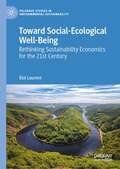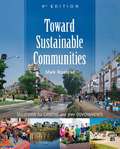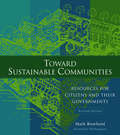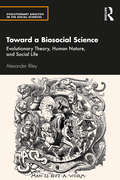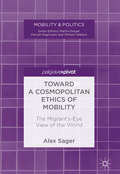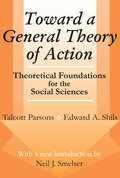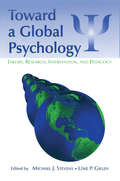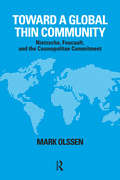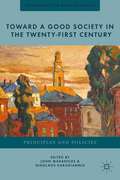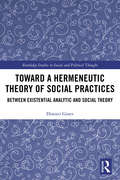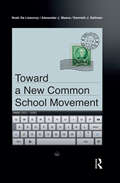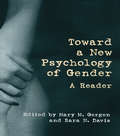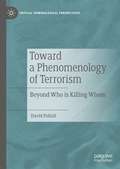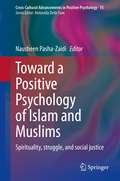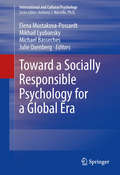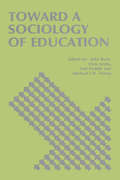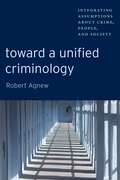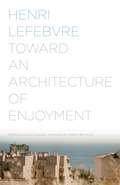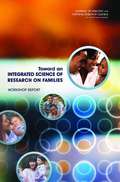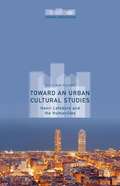- Table View
- List View
Toward Multimodal Pragmatics: A Study of Illocutionary Force in Chinese Situated Discourse (China Perspectives)
by Lihe HuangClassic pragmatic theories emphasize the linguistic aspect of illocutionary acts and forces. However, as multimodality has gained importance and popularity, multimodal pragmatics has quickly become a frontier of pragmatic studies. This book adds to this new research trend by offering a perspective of situated discourse in the Chinese context. Using the multimodal corpus approach, this study examines how speakers use multiple devices to perform illocutionary acts and express illocutionary forces. Not only does the author use qualitative analysis to study the types, characteristics, and emergence patterns of illocutionary forces, he also performs a quantitative, corpus-based analysis of the interaction of illocutionary forces, emotions, prosody, and gestures. The results show that illocutionary forces are multimodal in nature while meaning in discourse is created through an interplay of an array of modalities. Students and scholars of pragmatics, corpus linguistics, and Chinese linguistics will benefit from this title.
Toward Positive Youth Development: Transforming Schools and Community Programs
by Marybeth Shinn Hirokazu YoshikawaThis book shows how to harness the power of settings. It shifts the debate from simply enhancing youth outcomes at the individual level to improving the settings of youths' daily lives. The book offers researchers and practitioners blueprints for creating and changing influential settings including classrooms, schools, universities, out-of-school time programs, ethnic systems of supplementary education, and other community-based programs. Leading scholars in psychology, education, human development, sociology, anthropology, economics, law, and public policy discuss a wide array of social change strategies, and describe how to measure key features of settings as a target and guide for change. The authors also demonstrate how larger social structures - such as school districts, community coalitions, community data resources - can support change. Many of the chapters describe ways to make settings work for all youth, including those marginalized by reason of race, ethnicity, social class, or sexual orientation. Toward Positive Youth Development will guide researchers, educators, administrators and policy makers to improve schools and youth programs for all of America's youth.
Toward Social Reporting: Next Steps (Social Science Frontiers)
by Otis Dudley DuncanA volume of Social Science Frontiers, a series of publications reviewing new fields for social development, aimed at foundation executives, administrators of research grant programs, directors of research organizations, and others concerned with making contemporary social science more useful for the function of social reporting.
Toward Social-Ecological Well-Being: Rethinking Sustainability Economics for the 21st Century (Palgrave Studies in Environmental Sustainability)
by Éloi LaurentThis book investigates the deep economic causes of environmental unsustainability and offers a new vision to rebuild sustainability economics. While sustainability scholars are hard at work with documenting the tangible systemic crisis of our Biosphere, the economic roots of this crisis are rarely exposed, examined nor addressed. This book’s central contribution to sustainability studies is to argue that what we should sustain is not economic growth but social-ecological well-being defined as a combination of planetary health, cooperation and justice resulting in human holistic prosperity. The long-term prosperity of humanity indeed relies on generating health and fostering cooperation informed by justice: social-ecological well-being should be the cornerstone of sustainability economics for the 21st century. Within this framework, this book attempts to explain why the three key dimensions of sustainability are jointly in crisis, show what vision can articulate those dimensions to rethink sustainability economics for our century, what practical policies should be undertaken to give life to these visions before concluding on the need to reinvent the narratives that sustain economic analysis.
Toward Sustainable Communities
by Mark RoselandThe need to make our communities sustainable is more urgent than ever before. Toward Sustainable Communities remains the single most useful resource for creating vibrant, healthy, equitable, economically viable places. This comprehensive update of the classic text presents a leading-edge overview of sustainability in a new fully illustrated, full-color format.Compelling new case studies and expanded treatment of sustainability in rural as well as urban settings are complemented by contributions from a range of experts around the world, demonstrating how "community capital" can be leveraged to meet the needs of cities and towns for:*Energy efficiency, waste reduction, and recycling*Water, sewage, transportation, and housing*Climate change and air quality*Land use and urban planning.Fully supported by a complete suite of online resources and tools, Toward Sustainable Communities is packed with concrete, innovative solutions to a host of municipal challenges. Required reading for policymakers, educators, social enterprises, and engaged citizens, this "living book" will appeal to anyone concerned about community sustainability and a livable future.Mark Roseland is director of the Centre for Sustainable Community Development at Simon Fraser University and professor at SFU's School of Resource and Environmental Management. He lectures internationally, advises communities and governments on sustainable development policy and planning, and has been cited as one of British Columbia's "top fifty living public intellectuals."
Toward Sustainable Communities
by Stacy Mitchell Mark RoselandLocal governments are increasingly caught between rising expectations that development initiatives be sustainable and the fact that more and more services are being downloaded to the municipal level. The third edition of this classic text offers practical suggestions and innovative solutions to a range of community problems---including energy efficiency, transportation, land use, housing, waste reduction, recycling, air quality and governance. In clear language, with updated tools, initiatives and resources, a new preface and foreword, this sustainable practices resource is for both citizens and governments.Mark Roseland is director of the Centre for Sustainable Community Development at Simon Fraser University in British Columbia. He lectures internationally and advises communities and governments.
Toward a Biosocial Science: Evolutionary Theory, Human Nature, and Social Life (Evolutionary Analysis in the Social Sciences)
by Alexander RileySociology is in crisis. While other disciplines have taken on board the revolutionary discoveries driven by evolutionary biology and psychology, genomics and behavioral genetics, and the neurosciences, sociology has ignored these advances and embraced a biophobia that threatens to drive the discipline into marginality. This book takes its place in a rich tradition of efforts to integrate sociological thinking into the world of the biological sciences that can be traced to the origins of the discipline, and that took on modern form beginning a generation ago in the works of thinkers such as E.O. Wilson, Richard Alexander, Joseph Lopreato, and Richard Machalek. It offers an accessible introduction to rethinking sociological science in consonance with these contemporary biological revolutions. From the standpoint of a biosociology rooted in the single most important scientific theory touching on human life, the Darwinian theory of natural selection, the book sketches an evolutionary social science that would enable us to properly attend to basic questions of human nature, human behavior, and human social organization. Individual chapters take on such topics as: The roots and nature of human sociality; the origins of morality in human social life and an evolutionary perspective on human interests, reciprocity, and altruism; the sex difference in our species and what it contributes to an explanation of sociological facts; the nature of stratification, status, and inequality in human evolutionary history; the question of race in our species; and the contribution evolutionary theory makes to explaining the origins and the importance of culture in human societies.
Toward a Cosmopolitan Ethics of Mobility: The Migrant's-Eye View of the World (Mobility & Politics)
by Alex SagerThis book proposes a cosmopolitan ethics that calls for analyzing how economic and political structures limit opportunities for different groups, distinguished by gender, race, and class. The author explores the implications of criticisms from the social sciences of Eurocentrism and of methodological nationalism for normative theories of mobility. These criticisms lend support to a cosmopolitan social science that rejects a principled distinction between international mobility and mobility within states and cities. This work has interdisciplinary appeal, integrating the social sciences, political philosophy, and political theory.
Toward a General Theory of Action
by Talcott Parsons Edward A. ShilsToward a General Theory of Action is an extremely ambitious formulation of the ingredients, dimensions, and ranges that determine human behavior. Parsons and Shils enunciate principles that are at the core of contemporary social science preoccupations--including the precarious balance between social integration and conflict. The volume is one of the most notable sociological theorists of the century, symbolizing the interdisciplinary impulse that typified a widespread belief in the unity of the sciences.
Toward a General Theory of Action: Theoretical Foundations for the Social Sciences
by Robert CarkhuffThis new edition introduces the social science audiences of a new century to one of the classic highlights of the mid-twentieth century. This is the most general statement of the general theory of action as it was developed by its principle exponent, Talcott Parsons, and his close collaborators who formed the core of the fabled department of social relations at Harvard University. Toward a General Theory of Action is an extremely ambitious formulation of the ingredients, dimensions, and ranges that determine human behavior.Parsons and Shils enunciate principles that are at the core of contemporary social science preoccupations-including the precarious balance between social integration and conflict. The volume is at once universal in intent and highly personal, an expression of Parsons' thought, one of the most notable sociological theorists of the century. Finally, the book symbolizes the interdisciplinary impulse that typified a widespread belief in the unity of the sciences. This edition includes the collaborative group's introductory statement, Richard Sheldon's essay on the theoretical and philosophical status of the general theory of action, and "Values, Motives and Systems of Action" by Parsons and Shils.Guy Swanson, writing in the The American Sociological Review, noted that "Parsons and Shils have performed a major service in clearing away many old controversies, in showing the reasonableness of a behavioral foundation for general theory in social science as a whole and in sociology in particular, in clarifying the interrelations among many concepts, and in the insightful interpretation of particular pieces of data." It is testimony to this book's continuing significance that it continues to generate new lines of research and writings.
Toward a Global Psychology: Theory, Research, Intervention, and Pedagogy (Global And Cross-cultural Psychology Ser.)
by Uwe P. Gielen Michael J. StevensToward a Global Psychology defines the emerging field of international psychology. It provides an overview of the conceptual models, research methodologies, interventions, and pedagogical approaches that are most appropriate to transnational settings. In so doing, the book provides readers with a rich appreciation of how to approach a global psycho
Toward a Global Psychology: Theory, Research, Intervention, and Pedagogy (Global and Cross-Cultural Psychology Series)
by Michael J. Stevens and Uwe P. GielenToward a Global Psychology defines the emerging field of international psychology. It provides an overview of the conceptual models, research methodologies, interventions, and pedagogical approaches that are most appropriate to transnational settings.
Toward a Global Thin Community: Nietzsche, Foucault, and the Cosmopolitan Commitment
by Mark Olssen"Toward a Global 'Thin' Community re-examines aspects of the liberal-communitarian debate. While critical of both traditions, this book argues that a coherent form of communitarianism is the only plausible option for citizens today. Using the theories of Friedrich Nietzsche and Michel Foucault, Olssen shows how we can overcome traditional problems with communitarianism by using an ethic of survival that he identifies in the writings of Nietzsche and others to provide a normative framework for twenty-first century politics at both national and global levels. "Thin" communitarianism seeks to surmount traditional objections associated with Hegel and Marx, and to safeguard liberty and difference by applying a robust idea of democracy."
Toward a Good Society in the Twenty-First Century
by John Marangos Nikolaos KaragiannisHaving previously defined a good society as a sustainable society with a high level of development, significant provision of meaningful jobs, and low levels of inequality and social ills, Toward a Good Society in the Twenty-first Century provides a wide range of principles and policies that would be necessary if we are to achieve a good society. Marangos and Karagiannis have put together a comprehensive volume that explores the principles and policies needed to bring about the good society, and focuses on four broad themes which are deemed important towards achieving a good or better society: quality education and fair distribution; environmentally sustainable prosperity; inclusive economic development and significant job creation; and beneficial civic institutions, and deepening of freedom and time use. All these topics can be highly controversial and call for alternative perspectives on theoretical (philosophical) and policy grounds.
Toward a Hermeneutic Theory of Social Practices: Between Existential Analytic and Social Theory (Routledge Studies in Social and Political Thought)
by Dimitri GinevRecent methodological debates have shown that practice theory can either be developed by combining and slightly extending established theoretical concepts of inter-subjectivity, social normativity, collective behavior, interaction between agents and environment, habits, learning, collective intentionality, and human agency; or by following a strategy that promotes the quest for completely autonomous concepts. In the latter case, one defends a thesis of irreducibility. Toward a Hermeneutic Theory of Social Practices advocates this thesis by approaching the interrelational dynamic of social practices in terms of existential analytic. Indeed, this insightful volume outlines a methodology of the double hermeneutics that allows the study of the entanglement of agential plans, beliefs, and intentions with configured practices; while also demonstrating how interrelated social practices with which agency is entangled articulate cultural forms of life. Suggesting a framework for studying the cultural forms of life within the scope of practice theory, this book will appeal to postgraduate students and postdoctoral researchers interested in fields such as Social Theory, Philosophy of Social Science, and Research Methods for Social and Behavioral Sciences.
Toward a New Common School Movement (Critical Interventions)
by Alexander J Means Kenneth J. Saltman Noah De Lissovoy"Toward a New Common School Movement" is a bold and urgent call to action.The authors argue that corporate school reform in the United States represents a failed project subverted by profiteering, corruption, and educational inequalities."Toward a New Common School Movement" suggests that educational privatization and austerity are not simply bad policies but represent a broader redistribution of control over social life-that is, the enclosure of the global commons. This condition requires far more than a liberal defense of public schooling. It requires recovering elements of the radical progressive educational tradition while generating a new language of the common suitable to the unique challenges of the global era. "Toward a New Common School Movement" traces the history of struggles over public schooling in the United States and provides a set of ethical principles for enacting the commons in educational policy, finance, labor, curriculum, and pedagogy. Ultimately, it argues for global educational struggles in common for a just and sustainable future beyond the crises of neoliberalism and predatory capitalism.
Toward a New Psychology of Gender: A Reader
by Mary M. Gergen Sara N. DavisDrawn from a brilliant array of voices primarily from psychology, but also from other social sciences and humanities, this unique reader of creative and intellectually provocative essays investigates the social construction of gender. For the past several decades, those involved with the study of the psychology of women and gender have been struggling for recognition within the framework of psychology. This volume brings together the writings from psychology, philosophy, psychoanalysis, history, women's studies, education and sociology that critique mainstream thinking and exemplify new ways of creating inquiry.
Toward a Phenomenology of Terrorism: Beyond Who is Killing Whom (Critical Criminological Perspectives)
by David PolizziThis book examines the socio-psychological dynamics and drivers of terrorism from a humanistic perspective. Most interpret terrorism as meaningless, asocial violence but this book argues that it's not just a case of seeing 'who is killing whom' but that defining and understanding terrorism is configured by historical context and immediate experience. The author argues that these acts of terrorist violence can be interpreted as the external expression of repressed feelings and impulses that have been tabooized by mainstream society. Upon release, these terrorists gain a new 'nomos' which generates a sense of meaning and significance for them. This book draws on psycho-analytical theories of repression, Heideggerian existentialism, Berger’s anthropological concept of culture as ‘nomos’, and Roger Griffin’s analysis of terrorist fanaticism, adding to the understanding terrorism and criminality from a new perspective and beyond the usual literature situated in political science, security/war and peace studies. This book seeks to provide: a definition of terrorism, an account of the psychological theory, an explanation of the nomic dimension of terroristic violence, an exploration of the relevance of the new approach to understanding: Salafi jihadism, Al-Qaeda, Islamic State, the Taliban, White Supremacism, the rise of the Radical Right, and reflections on this for combating terrorism. It appeals to those interested in terrorism, conflict, terrorist radicalization and motivation, international relations, politics and religious politics, and to counter-terrorism agencies.
Toward a Positive Psychology of Islam and Muslims: Spirituality, struggle, and social justice (Cross-Cultural Advancements in Positive Psychology #15)
by Nausheen Pasha-ZaidiThis book integrates research in positive psychology, Islamic psychology, and Muslim wellbeing in one volume, providing a view into the international experiential and spiritual lives of a religious group that represents over 24% of the world’s population. It incorporates Western psychological paradigms, such as the theories of Jung, Freud, Maslow, and Seligman with Islamic ways of knowing, while highlighting the struggles and successes of minoritized Muslim groups, including the LGBTQ community, Muslims with autism, Afghan Shiite refugees, and the Uyghur community in China.It fills a unique position at the crossroad of multiple social science disciplines, including the psychology of religion, cultural psychology, and positive psychology. By focusing on the ways in which spirituality, struggle, and social justice can lead to purpose, hope, and a meaningful life, the book contributes to scholarship within the second wave of positive psychology (PP 2.0) that aims to illustrate a balance between positive and negative aspects of human experience. While geared towards students, researchers, and academic scholars of psychology, culture, and religious studies, particularly Muslim studies, this book is also useful for general audiences who are interested in learning about the diversity of Islam and Muslims through a research-based social science approach.
Toward a Socially Responsible Psychology for a Global Era
by Elena Mustakova-Possardt Mikhail Lyubansky Michael Basseches Julie OxenbergThis book explores the concept of "socially-responsible psychology in a global age" and how it might be used to organize, integrate and bring enhanced focus a field that has the potential to contribute to solutions to the world's most pressing problems. In this volume, the editors explore the central and defining features of socially-responsible psychology, challenges that this work would face, and the mechanisms and processes by which psychological work could be synergistically integrated with the work of other disciplines. For this purpose, the volume also examines a variety of factors currently that limit psychology in carrying out this goal.
Toward a Sociology of Education
by John Beck, Chris Jenks, Nell Keddie and Michael F.D. YoungBy including material from literary, philosophical, and anthropological sources, and by selecting readings which consider educational practice both within and beyond formal educational contexts, this book broadens the character of sociological inquiry in education. The editors bring together material they have found valuable when working with students of education and sociology at all levels. Many of these articles and extracts are either inaccessible or have not been reprinted. The collection should stimulate inquiry about the assumptions underlying current debates on curriculum, streaming, school organization, methods of teachin, and preconceived notions of ability.
Toward a Unified Criminology: Integrating Assumptions about Crime, People and Society (New Perspectives in Crime, Deviance, and Law #1)
by Robert AgnewWhy do people commit crimes? How do we control crime? The theories that criminologists use to answer these questions are built on a number of underlying assumptions, including those about the nature of crime, free will, human nature, and society. These assumptions have a fundamental impact on criminology: they largely determine what criminologists study, the causes they examine, the control strategies they recommend, and how they test their theories and evaluate crime-control strategies. In Toward a Unified Criminology, noted criminologist Robert Agnew provides a critical examination of these assumptions, drawing on a range of research and perspectives to argue that these assumptions are too restrictive, unduly limiting the types of "crime" that are explored, the causes that are considered, and the methods of data collection and analysis that are employed. As such, they undermine our ability to explain and control crime. Agnew then proposes an alternative set of assumptions, drawing heavily on both mainstream and critical theories of criminology, with the goal of laying the foundation for a unified criminology that is better able to explain a broader range of crimes.
Toward an Architecture of Enjoyment
by Henri LefebvreToward an Architecture of Enjoyment is the first publication in any language of the only book devoted to architecture by Henri Lefebvre. Written in 1973 but only recently discovered in a private archive, this work extends Lefebvre&’s influential theory of urban space to the question of architecture. Taking the practices and perspective of habitation as his starting place, Lefebvre redefines architecture as a mode of imagination rather than a specialized process or a collection of monuments. He calls for an architecture of jouissance—of pleasure or enjoyment—centered on the body and its rhythms and based on the possibilities of the senses.Examining architectural examples from the Renaissance to the postwar period, Lefebvre investigates the bodily pleasures of moving in and around buildings and monuments, urban spaces, and gardens and landscapes. He argues that areas dedicated to enjoyment, sensuality, and desire are important sites for a society passing beyond industrial modernization. Lefebvre&’s theories on space and urbanization fundamentally reshaped the way we understand cities. Toward an Architecture of Enjoyment promises a similar impact on how we think about, and live within, architecture.
Toward an Integrated Science of Research on Families: Workshop Report
by Institute of Medicine National Research Council of the National AcademiesDemographic changes, immigration, economic upheavals, and changing societal mores are creating new and altered structures, processes, and relationships in American families today. As families undergo rapid change, family science is at the brink of a new and exciting integration across methods, disciplines, and epistemological perspectives. The purpose of The Science of Research on Families: A Workshop, held in Washington, DC, on July 13-14, 2010, was to examine the broad array of methodologies used to understand the impact of families on children's health and development. It sought to explore individual disciplinary contributions and the ways in which different methodologies and disciplinary perspectives could be combined in the study of families. Toward an Integrated Science of Research on Families documents the information presented in the workshop presentations and discussions. The report explores the idea of family research as being both basic and applied, offering opportunities for learning as well as intervention. It discusses research as being most useful when organized around particular problems, such as obesity or injury prevention. Toward an Integrated Science of Research on Families offers a problem-oriented approach that can guide a broad-based research program that extends across funders, institutions, and scientific disciplines.
Toward an Urban Cultural Studies
by Benjamin FraserToward an Urban Cultural Studies is a call for a new interdisciplinary area of research and teaching. Blending Urban Studies and Cultural Studies, this book grounds readers in the extensive theory of the prolific French philosopher Henri Lefebvre. Appropriate for both beginners and specialists, the first half of this book builds from a general introduction to Lefebvre and his methodological contribution toward a focus on the concept of urban alienation and his underexplored theory of the work of art. The second half merges Lefebvrian urban thought with literary studies, film studies and popular music studies, successively, before turning to the videogame and the digital humanities. Benjamin Fraser's approach consistently emphasizes the interrelationship between cities, culture, and capital.
